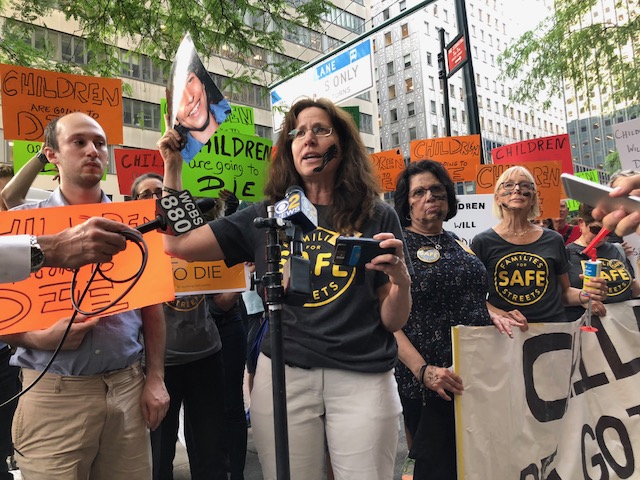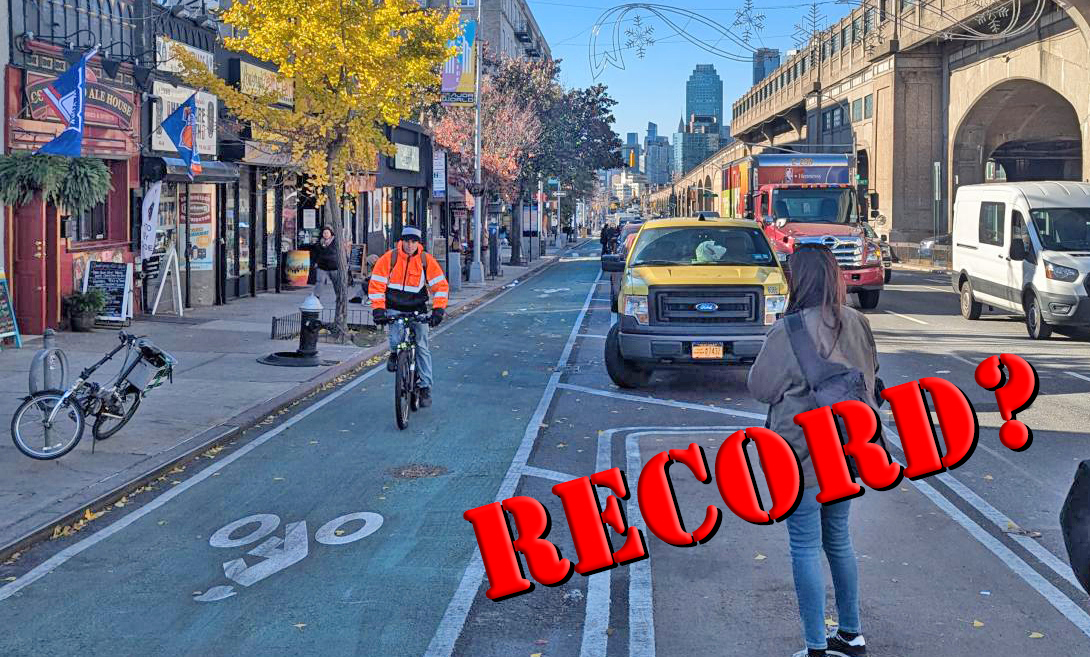Abandoned.
That's how safe streets advocates feel after state lawmakers left Albany on Friday without passing a slate of bills aimed to save children, protect cyclists and make streets more livable.
As the legislative session ended late on Thursday night, the state Senate did pass "Sammy's Law," the bill allowing New York City to set its own speed limits without Albany approval, but the Assembly failed to hold a vote before the session ended. No special session that would summon lawmakers back to the Capitol has been scheduled.
Sammy's Law — named after 12-year-old Sammy Cohen Eckstein who was killed by a reckless driver in Brooklyn in 2013 — passed overwhelmingly (the vote was 54-9) in the Senate.
“Lower speed limits save lives," said Brad Hoylman, the bill's Senate sponsor. "Sammy’s Law is a monumental piece of legislation that will make our streets safer for decades to come. As New York City is in the midst of a crisis of vehicular violence, it makes absolutely no sense that Albany has control over the City’s speed limits."
Lawmakers and advocates including Sammy's mother, Amy Cohen, the co-founder of Families For Safe Streets, pushed for the bill in the Assembly during the final hours of the session. The legislature indeed showed it could act — it voted on a bill for gun violence research and a COVID-19 small business recovery grant — but Sammy's Law was not included. A special session can be called if two-thirds of the Assembly ask for one for the bill.
The Assembly can pass Sammy’s Law tonight.
— Transportation Alternatives *Vote on Sammy's Law* (@TransAlt) June 10, 2021
Or it can let traffic deaths continue to skyrocket without taking action.
Please do the right thing. Save lives this year. @CarlHeastie @BillMagnarelli https://t.co/5pjiNkIevz
Advocates point out that the speed limit bill is desperately needed because road fatalities are on pace to make 2021 the bloodiest full year of Mayor de Blasio's Vision Zero initiative. As of June 6, 103 people have died on city streets, up from 69 during the same period last year and roughly 75 in a typical year.
Update: When people say this is on pace to be the bloodiest full year of the Vision Zero era, they ain’t lying. Fresh stats from DOT show the carnage: pic.twitter.com/ZPeJKVFZVy
— Streetsblog New York (@StreetsblogNYC) June 10, 2021
Other cities such as Washington, D.C., Portland, Cambridge, Seattle and the Twin Cities are able to set their own speed limits without statehouse approval. And doing so is crucial: There was a 36-percent decline in pedestrian fatalities in New York City after speeds limits were lowered to 25 mph (20 mph in school zones) in 2014.
The other unpassed bills in the package include:
- Pre-test driver education bills (S1078A/A5084) would require specific training for new motorists on how to deal with cyclists and pedestrians. This bill has passed the Senate only.
- Dangerous Driving “Rule of Two” (S7894/A8881A) would clarify existing law to address allow prosecutions of drivers for committing one moving violation instead of requiring two wrongful acts such as speeding, running a red, failure to yield, etc. The legislation would also replace “reckless” with “dangerous” in “reckless driving” so that prosecutors no longer have to prove that a driver willfully committed a violent act with a car.
- Vehicle Safety Rating (S4307/A575) would require the state DOT and the state Department of Motor Vehicles to create a safety-rating system to assess the risk a motor vehicle poses to vulnerable road users, and would require that such ratings be displayed at the point of sale and on a state website. No safety-rating system exists for risks a vehicle poses to people outside a car, which are especially acute for large, heavy vehicles. In New York City, 25 of the 29 cyclists who were killed in 2019 were killed by drivers of large trucks, buses, SUVs or vans.
- Speed-Safety Camera Improvement (S5602/A6681) would authorize New York City to operate speed-safety cameras 24/7, would escalate penalties for extreme repeat offenders, including license suspension and would allow records of speeding to be shared with auto insurance companies.
- Traffic-Crash-Victim Bill of Rights which gives crash victims rights like those of the federal Crime Victims’ Rights Act, including the right to receive timely crash reports and the right to attend crash-related hearings and submit impact statements. It would also require the state to report data about crash-victim compensation and support, including no-fault insurance and private insurance.
- Blood-Alcohol Content Lowered to .05 (S131/A7197) would lower the blood alcohol concentration limit for driving from .08 percent to .05 percent because drivers are likely to be impaired at the current level. The bill has been introduced every session since 2013.
- Safe Passage For Cyclists (S4529/A547) would provide a clear objective definition of what a “safe distance” is for motorists when overtaking bicyclists on the road (at least three feet), provide a mechanism for accountability following a crash, and foster a culture of safer driving through education. The Senate version has passed, though it carved out New York City for this vital safety improvement.






